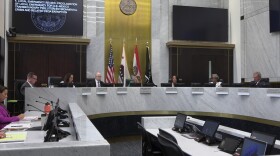In Tijuana’s Agape migrant shelter, the entire morning revolves around a phone app.
People wake up as early as 5 a.m. to log into the CBP One mobile app, which was designed to connect vulnerable migrants to the U.S. asylum system. The app allows migrants to schedule appointments so they can enter the U.S. and plead their case for asylum.
“I’ve seen people scream and others cry because of how happy they are when they get an appointment,” said Vidal Garcia, a Mexican asylum seeker and one of the 650 people who live in the shelter.
Despite trying to secure an appointment every day for the last month, Garcia has had no luck.
He’s not alone.
Data from the Mexican government shows that the majority of CBP One appointments aren’t going to vulnerable migrants like Garcia. Instead, they are going to migrants who tend to have more resources.
Of the approximately 15,000 migrants in Tijuana who have secured CBP One appointments, 44% of them have been Russian nationals. Haitians make up 18%, followed by Mexicans and Venezuelans who each account for 12% of the appointments.
Despite getting nearly half of the coveted appointments, Russian nationals make up less than 10% of Tijuana’s overall migrant population, according to Enrique Lucero, head of Tijuana’s migrant affairs department.
After an inquiry from KPBS, U.S. Customs and Border Protection announced changes to the app on Friday. Going forward, the agency will expand the number of daily appointments, give more time to complete appointment requests, and prioritize people who have been waiting the longest. These changes will start May 10, according to a press release.
But despite those changes, Lucero said the last five months have been a huge economic and racial disparity.

“There is no filter to determine who is more vulnerable, and I think that is one of the major flaws of the app,” he said.
To illustrate his point, Lucero gave an example of a typical Russian and Central American migrant.
Russian nationals tend to fly into Mexico on tourist visas. They can afford to stay in hotels and connect their iPhones and Samsung phones to strong Wi-Fi signals. Meanwhile, Guatemalan nationals often walk or hitchhike to Tijuana. They sleep in overcrowded migrant shelters and struggle to connect outdated phones to the same Wi-Fi signal that 100 other migrants are using.
- ICE is suddenly showing up in California hospitals. Workers want more guidance on what to do
- Arrest near a South Bay high school is latest in a string of immigration enforcements close to schools
- Arrest near a South Bay high school is latest in a string of immigration enforcements close to schools
- Immigration enforcement taking serious toll on children’s mental health
“There are migrants who have been waiting for an appointment since the app launched in January,” Lucero said. “But other migrants with more resources get one within a week.”
Garcia is one of those still on the outside looking in.
He said people cheer each other on whenever they get appointments. But they are also distraught over not getting one themselves.
“I am happy because I wish them the best,” Garcia said. “But then I get in the office and start to cry. Sometimes, but not all the time.”
Migrants at the shelter don't resent Russian war refugees for getting more appointments, they just want the same opportunity, Garcia added.
Pastor Albert Rivera runs the Agape migrant shelter. He’s aware of the racial and economic disparities brought by the CBP One app. To combat them, he invested in a stronger W-Fi connection at the shelter.

But it’s still not enough.
“You have to be very close to the modem,” he said. “If you are not right next to it, you don’t get a strong signal.”
Some of the migrants pay 200 pesos a day, or $10, to get their own internet access. But that just exacerbates the economic disparities, Albert said.
“If you don’t have money, you don’t have internet and you can’t get an appointment,” he said. “That’s another problem.






